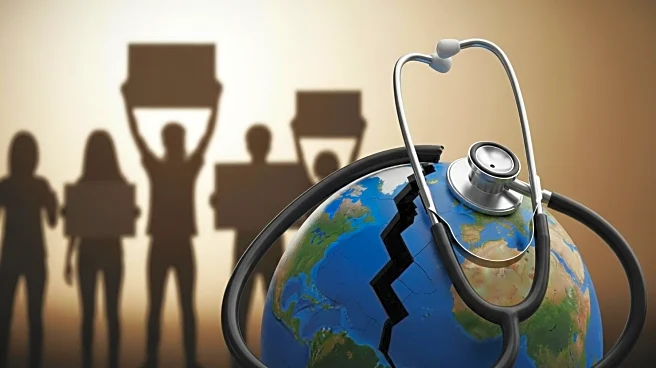What's Happening?
Youth-led protests erupted across Morocco, with demonstrators clashing with police over the government's spending priorities. The protests, which are among the largest anti-government demonstrations in years, were sparked by frustrations over the government's investment in international sporting events, such as the 2030 FIFA World Cup, while neglecting health and education sectors. Protesters in at least 11 cities, including Rabat and Marrakech, voiced their anger over corruption and the struggling healthcare system, chanting slogans like 'Stadiums are here, but where are the hospitals?' The protests were organized through social media platforms like TikTok and Discord, reflecting a leaderless movement driven by groups such as 'Gen Z 212' and 'Morocco Youth Voices.' Police responded with arrests, and the Moroccan Association for Human Rights reported over 120 people detained.
Why It's Important?
The protests highlight significant public discontent with the Moroccan government's allocation of resources, particularly in the context of healthcare and education. The demonstrations underscore a broader issue of regional inequities and the prioritization of international events over essential public services. The unrest reflects a growing demand for systemic reforms, including better salaries, jobs, and living conditions. The involvement of youth and the use of social media for organization indicate a shift in protest dynamics, potentially influencing future political and social movements in Morocco. The government's response, including arrests and dismissals of health officials, suggests a crackdown on dissent and raises concerns about freedom of expression.
What's Next?
Following the protests, Moroccan Health Minister Amine Tahraoui has taken steps to address some of the grievances by firing the hospital director and regional health officials. However, the underlying issues of healthcare inadequacies and government spending priorities remain unresolved. The protest groups have indicated plans for future demonstrations, suggesting continued pressure on the government to enact reforms. The situation may lead to further clashes and arrests, as authorities attempt to maintain control. The international community and human rights organizations may increase scrutiny on Morocco's handling of the protests and its commitment to improving public services.
Beyond the Headlines
The protests in Morocco reflect a broader trend of youth-led movements globally, inspired by similar actions in countries like Nepal. The use of social media as a tool for organizing and mobilizing protests represents a shift in how political activism is conducted, potentially leading to more decentralized and spontaneous movements. The focus on healthcare and education highlights ethical concerns about government priorities and the impact on vulnerable populations. Long-term, these protests could influence policy changes and encourage greater civic engagement among Morocco's youth, who constitute a significant portion of the population.











